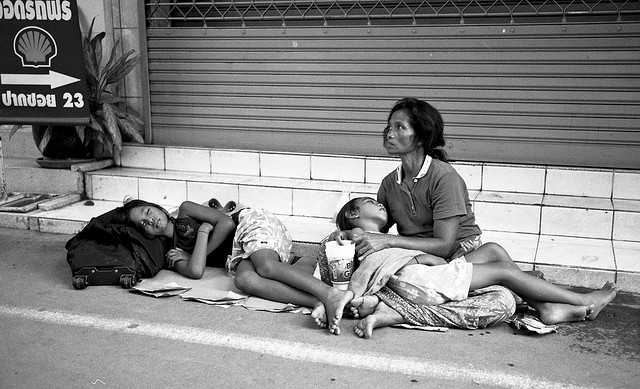“Once upon a time….a world with no poverty”
November 29 Poverty is a stubborn problem in virtually every country, writes Collins Kimaro, 19, a Correspondent from Tanzania. He imagines the impact of a world without poverty, and the hurdles to creating it.
Poverty is a stubborn problem in virtually every country, writes Collins Kimaro, 19, a Correspondent from Tanzania. He imagines the impact of a world without poverty, and the hurdles to creating it.
Once upon a time in a land far, far away a new world order flourishes. It is a world where equality reigns and famine is history. A world where the Millennium Development Goals have succeeded and aid is a thing of the past. A world where all men can put food on their plates and send their children to school.
A world without poverty.
What is poverty?
Poverty is a dark tale that does not have to be told to little children. Its evidence is its victims that can be witnessed on a single walk down any street. A plague that affects every society, manifesting as extreme poverty for 1.3 billion people, or as relative poverty in its cases of minor infections. Many still debate the United Nations’ definition that extreme poverty means having less than $1.25 a day. Failing to simply agree on its definition leaves the quest of finding its cure a complex one.
What does such a world look like?
Due to our dismal reality it seems difficult to even imagine what a world without poverty would constitute. It would be a world of no homelessness, no unemployment and no charities. Societies would brim with high literacy rates and be only minutely affected by infant mortality rates.
As poverty is also of a relative nature, a world without poverty would also mean no income inequality. Indeed the cry for the world’s rich to stop getting richer is echoed around the world. Yet it is these same voices that decide to put more resources into the relatively few rich and thus continue to increase the gap.
Many would also agree that increasing low wages is one way that could help reduce poverty, though this is contrary to the fundamental aspect of our capitalist societies: competition. In its essence the system necessitates a pool of unemployment to fuel this competition and keep workers competing against each other.
What about the corporations and neo-liberalists who profit from cuts to public spending? These driving forces of the economy would then increase their costs and coupled with the wage increase, augment the general price level thus reducing the general standard of living.
The fantasy begins to lose its romance in the entanglement of our capitalist societies. Founded on a system where for one to succeed another one fails, one could conclude that poverty has become a necessary part of the economic system. It also referees the game that is International Relations, dictating which are the super powers and which are those not so powerful.
Is it possible?
Jeffery Sachs, an American economist and author of The End of Poverty, has recently calculated that the world could in fact end global extreme poverty in simply 20 years with an annual cost of $175 billion; a mere 0.7 per cent of the combined national gross product of the 30 countries that make-up the Organisation for Economic Co-operation and Development (OECD.)
Yet poverty remains, and its complete extinction is confined to the boundaries of our imaginations. It is evident that this solution, given its difficulties, will not come and challenge the world to create new social and political systems to encompass a more affluent populace.
Will the day dawn where the world will live happily ever after?
photo credit: Sailing “Footprints: Real to Reel” (Ronn ashore) via photopin cc
………………………………………………………………………………………………………………
About me: We live in a time when the world’s workings are being re-written and unbound possibilities opening up. My ambitions align with this and I aspire to join the field of International Development and help fuel African’s impending rise. I enjoy exploring new cultures, current affairs and the beautiful art that is spoken word.
Apart from being an Economics student at the University of Warwick I am excited to be part of AIESEC Warwick and Treasurer for Warwick World Food Programme.
………………………………………………………………………………………………………………
Opinions expressed in this article are those of the author and do not necessarily represent the views of the Commonwealth Youth Programme. Articles are published in a spirit of dialogue, respect and understanding. If you disagree, why not submit a response?
To learn more about becoming a Commonwealth Correspondent please visit:
http://www.yourcommonwealth.org/submit-articles/commonwealthcorrespondents/
………………………………………………………………………………………………………………




